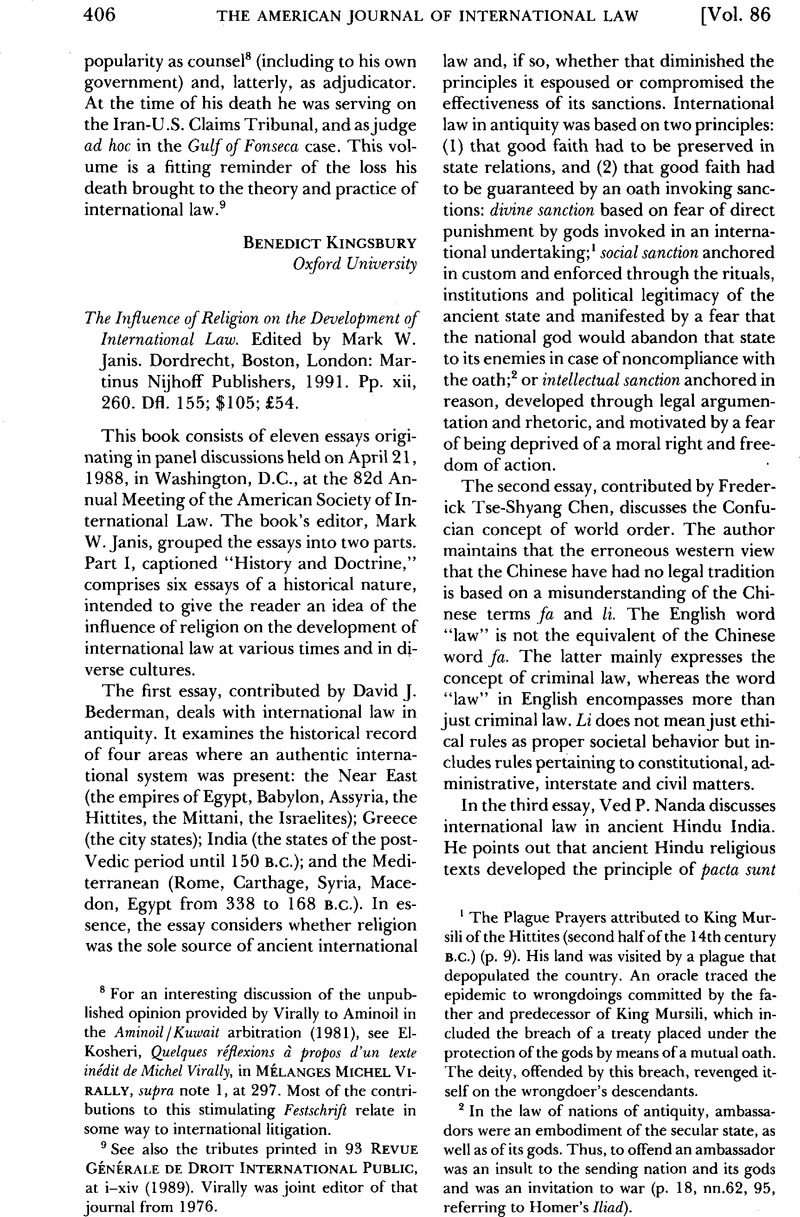No CrossRef data available.
Article contents
The Influence of Religion on the Development of International Law. Edited by Mark W. Janis. Dordrecht, Boston, London: Martinus Nijhoff Publishers, 1991. Pp. xii, 260. Dfl. 155; $105; £54.
Published online by Cambridge University Press: 27 February 2017
Abstract

- Type
- Book Reviews and Notes
- Information
- Copyright
- Copyright © American Society of International Law 1992
References
1 The Plague Prayers attributed to King Mur- sili of the Hittites (second half of the 14th century B.C.) (p. 9). His land was visited by a plague that depopulated the country. An oracle traced the epidemic to wrongdoings committed by the fa ther and predecessor of King Mursili, which in cluded the breach of a treaty placed under the protection of the gods by means of a mutual oath. The deity, offended by this breach, revenged it self on the wrongdoer's descendants.
2 In the law of nations of antiquity, ambassa dors were an embodiment of the secular state, as well as of its gods. Thus, to offend an ambassador was an insult to the sending nation and its gods and was an invitation to war (p. 18, nn.62, 95, referring to Homer's Iliad).
3 See Augustus Hand's opinion in United States v. Kauten, 133 F.2d 703, 708 (2d Cir. 1943): Religious belief arises from a sense of the inadequacy of reason as a means of relating the individual to his fellow-men and to his universe . . . . It is a belief finding expression in a conscience which categorically requires the believer to disregard elementary self-interest and to accept martyrdom in preference to transgressing its tenets.
4 In Deuteronomy(23:20-21), the prohibition against lending at interest covers only a brother; strangers are excluded from the protection against usury. In modern Israel, financial engineering has been adopted to ensure the supply of credit, e.g., the lender becomes entitled to a share of the assets of the person to whom he has advanced the money. The medieval Christian church condemned all interest as theft. Islam prohibits the taking of the excess of return over principal on a loan. Consequently, some Muslim countries have developed interest-free banking systems based on partnership principles in which a depositor participates in a bank's profit and loss.
5 Debt forgiveness is a biblical theme running from the Law of Moses (during the seventh year debts were to be remitted) to the Gospels of Jesus (in Luke's Gospel, Jesus commands his followers to “lend expecting nothing"; Matthew's version of the Lord's Prayer asks for forgiveness of our debts “as we forgive our debtors.” However, some scholars take the position that the phrase in the Lord's Prayer relied upon by Park is an ex pression of pure faith, transcending debt forgive ness). U.S. and European church leaders have called debt relief for developing countries an im perative of the public order, not merely a matter of private morality.
6 In seeking to establish the illegality of nuclear weapons, reliance has been placed both on rules of customary international law (Grotius's distinc tion between jus ad helium and jus in bello) and on treaties such as the 1925 Geneva Protocol for the Prohibition of the Use in War of Asphyxiating, Poisonous or Other Gases, the United Nations Charter, the 1948 Genocide Convention and the four 1949 Geneva Conventions. In challenging British military expenditures, the Quakers have also invoked the fundamental right to freedom of thought, conscience and religion proclaimed in the Universal Declaration of Human Rights, the European Convention on Human Rights and the International Covenant on Civil and Political Rights.




